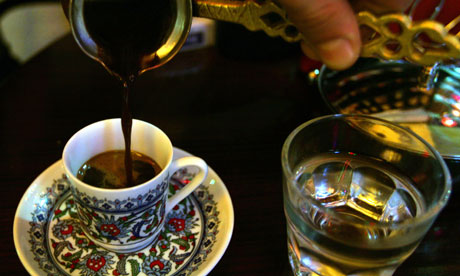
Turkey’s coffee culture arrived in London, it provides an opportunity for proper discussion about culture and politics, instead of laying down to work on notebooks or other gadgets.
London / NationalTurk – The concept of coffee houses (kahvehane) was invented almost five centuries ago in Istanbul, whereas it wasn’t Turks who turned the idea into a global business model, it was unexpectedly the Americans. While Turkish waiters kept on serving traditional coffee and water pipes to their loyal customers at cheap prices, Americans the ever entrepreneurs, have designed coffee menus full of delicacies and calories, decorated their coffee houses with comfy chairs, and offered free Wi-Fi. Nevertheless they will still find it hard to convince loyal Turkish coffee addicts into giving up our die-hard drinking habits: for many, the siren logo represents terrible coffee consumed over comfortable furniture and the flavour of Turkish coffee remains indispensable.
Turkish Coffee World in London, England
It is good news for Turks in England, then, that Turkish coffee culture has now pitched up right in the centre of London: a few weeks ago, Kahve Dünyası (‘The Coffee World’), our late-coming response to the Starbucks model, opened in Piccadilly Circus London. The Turkish cofffe chain was established as late as 2004 in Istanbul’s Eminonu district, albeit after Starbucks already had settled in Turkey, where the first ever coffee house opened its doors in 1555. Many Turks have fallen for Kahve Dünyası’s traditional but also conveniently modern ways: there are 68 types of coffee on offer as well as an extensive chocolate collection. Orders are taken by a waiter and not at a counter, and the Turkish coffee will arrive at your table the way you like it: plain, or with little, medium or lots of sugar and with a small glass of water. The water is to wash away the tastes in the mouth before you take your first sip of coffee. It’s all written in The Piccadilly branch in a guidebook for those not sufficiently acquainted with Turkish ways of drinking coffee. The thick foam at the top you should enjoy at length, but avoid telve, the grounds left at the bottom of the cup.
Ancient coffe houses were banned by Ottoman !
Once ideal places for Istanbul’s multicultural population who converged there to discuss current affairs, Turkish coffee houses are still spaces for conversation rather than work. Orhan Pamuk, Turkey’s Nobel laureate, made use of them in his monumental My Name is Red, where meddahs (storytellers) come together, telling vivid stories which make up chapters of the novel. Their stories are erotic, clever, funny and pointedly mocking of the country’s politicians. It is no surprise then that Istanbul’s coffee houses were closed by the authorities in the 16th century: spending too much time in them made people less virtuous, the authorities believed.
From Abdullah Gül to Quenn Elizabeth : Let’s discuss the future of Europe over a cup of Turkish Coffee
Turkey’s coffee houses are reminders of how liberty and conversation once triumphed in Ottoman culture, only to be suppressed later by authoritarian force. What a sight it would be one of these days to see the Turkish president Abdullah Gül, in London for a state visit, and his host the Queen discussing the future of Europe over a cup of Turkish coffee. Gül could tell a story or two about his own country’s experiences: how his prime minister, Recep Tayyip Erdogan, quickly became a symbol of resistance in geographies as diverse as Palestine, Egypt and Syria, and how the Turkish economy continued to grow in these troubled times. Not a single Turkish bank went bankrupt due to the euro crisis that struck Europe.
Importance of Turkish Coffee House Talk is not meant to be downplayed
The older generation of Turkish diplomats used to have a peculiar way of dismissing popular demands in the country: they would label them ‘coffee house talk’. But Erdogan’s coffee house talk approach seems to have worked: over the past decade, national economic output tripled and average incomes doubled under a secular model that blends European and Islamic values.
Turks didn’t invent democracy, and there are plenty of signs that the country is still working out what the term really means (just look at the latest arrests of Kurdish politicians). But our coffee houses, in Istanbul or London, are good locations to discuss it, as they have been for the past five centuries.
[adrotate banner=”37″]